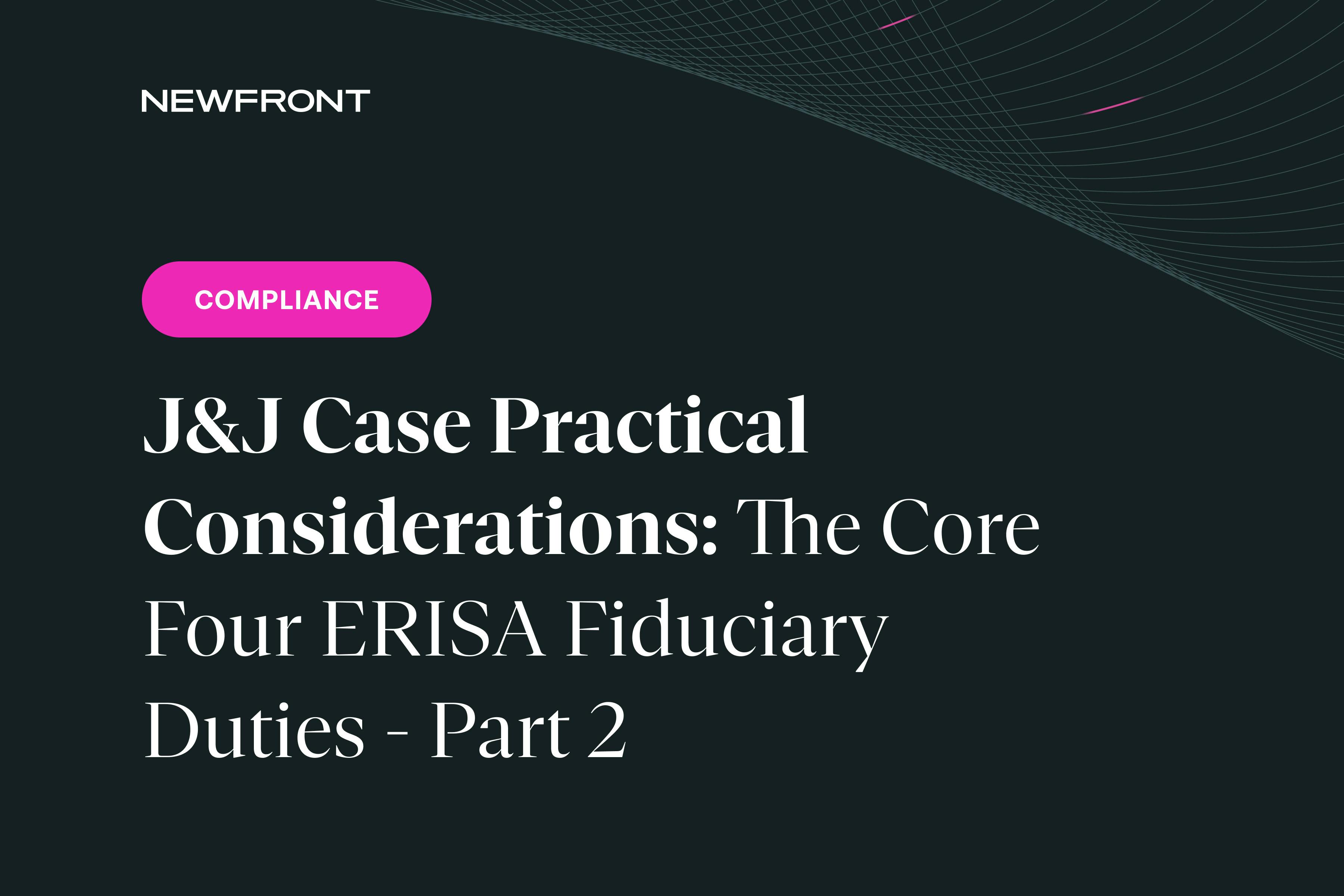CAA Surprise Billing Rules Preserve HSA Eligibility
By Brian Gilmore | Published October 19, 2021
Question: How do the CAA surprise billing provisions address HDHP status and HSA eligibility?
Short Answer: For plan years beginning on or after January 1, 2022, the CAA’s new surprise billing protection rules include provisions to ensure the plan payments do not cause plans to lose HDHP status or individuals to lose HSA eligibility.
General Rule: HSA Eligibility
The general rule is that an individual must meet two requirements to be HSA-eligible (i.e., to be eligible to make or receive HSA contributions):
Be covered by an HDHP; and
Have no disqualifying coverage (generally any medical coverage that pays pre-deductible, including Medicare).
HSA eligibility also requires that the individual cannot be claimed as a tax dependent by someone else.
For more details on everything HDHP/HSA, see our Newfront Office Hours Webinar: Go All the Way with HSA.
**Recent HSA Expansions: **Preventive, CARES Act, and Covid-Related HSA Eligibility Changes
After remaining relatively stable for an extended period since the HSA inception point in 2004, HSAs have been experiencing a whirlwind of enhancements in recent years. Although none of the changes by themselves are revolutionary, the modifications are significant in the aggregate.
Taken together, these changes have significantly improved HDHPs and HSAs by increasing reimbursable expenses and eliminating unnecessary barriers to eligibility:
(Effective July 2019)
Expansion of HDHP first-dollar coverage availability to include medical services and items to prevent exacerbation of a chronic condition.
Full details: IRS Expands Definition of Preventive Care for HDHPs
Free Covid Testing (Effective March 2020)
Plans will not fail to maintain HDHP status if they provide first-dollar coverage for medical care services and items purchased related to testing for and treatment of Covid.
Full details: IRS and DOL Issue Covid-19 Guidance Regarding HSA Eligibility
Telehealth Services (Effective for Plan Years Beginning on or Before December 31, 2021)
Plans will not fail to maintain HDHP status if they provide first-dollar coverage for telehealth or other remote care services—regardless of whether the services are preventive or related to Covid.
Full details: How the CARES Act Affects Employee Benefits
Over-the-Counter Medicines and Drugs (Effective for Expenses Incurred on or After January 1, 2020)
HSAs (and FSAs and HRAs) may reimburse over-the-counter medicines and drugs without the need for a prescription.
Full details: How the CARES Act Affects Employee Benefits
Menstrual Care Products (Effective for Expenses Incurred on or After January 1, 2020)
HSAs (and FSAs and HRAs) may reimburse menstrual care products—including tampons, pads, liners, cups, sponges, or other similar products.
Full details: How the CARES Act Affects Employee Benefits
Personal Protective Equipment (Effective for Expenses Incurred on or After January 1, 2020)
HSAs (and FSAs and HRAs) may reimburse PPE such as masks, hand sanitizer, and sanitizing wipes for the primary purpose of preventing the spread of Covid.
Full details: PPE Now Qualifies as FSA/HRA/HSA Eligible Medical Expense
CAA Surprise Billing: The New “No Surprises Act” Patient Protections
The Consolidated Appropriations Act, 2021 (CAA) significantly expanded the original ACA patient protection provisions for plan years beginning on or after January 1, 2022.
The CAA adds an extensive set of patient protections referred to as the “No Surprises Act.” Among those provisions are a series of rights and limitations designed to prevent surprise medical bills and end surprise air ambulance bills. These provisions are effective for plan years beginning on or after January 1, 2022, and they apply to both ACA non-grandfathered and grandfathered plans.
For more details, see our prior post: The ACA and CAA Patient Protections.
Emergency Services
Medical plans that cover emergency services must generally cover such services:
Without any prior authorization requirement;
Regardless of whether the provider is in-network;
Without imposing any requirement or limitation that is more restrictive for out-of-network emergency providers than in-network emergency providers;
Without any greater cost-sharing than would apply for in-network emergency services; and
By applying the cost-sharing payments for out-of-network emergency services toward any in-network deductible or out-of-pocket maximum in the same manner as if the services were provided in-network.
“Cost-sharing” for these purposes includes copayments, coinsurance, and (unlike the original ACA protection) deductibles.
Non-Emergency Services
Medical plans that cover out-of-network non-emergency items and services must generally cover such services:
Without any cost-sharing requirement that is greater than would apply if provided in-network;
By calculating the cost-sharing as if the total amount charged by the provider is the “recognized amount” for such items and services;
With initial notice of payment or denial transmitted to the provider within 30 calendar days of the bill for such services;
With payment to the provider within 30 days of the determination date for any amounts exceeding the cost-sharing owed by the participant; and
By counting the cost-sharing payments toward any in-network deductible and out-of-pocket maximum in the same manner as if the services were provided in-network.
The “recognized amount” is generally an averaging of cost determination, with the specific determination set based on state law if applicable, or otherwise set the Social Security All-Payer Model Agreement.
Air Ambulance
Medical plans that provide coverage for air ambulance services must generally cover such services by an out-of-network air ambulance provider in the following manner:
By applying the same cost-sharing that would apply if the air ambulance provider were in-network; and
Counting the cost-sharing amounts towards the in-network deductible and in-network out-of-pocket maximum in the same manner as if the services were provided in-network.
Air ambulance services include medical transport by helicopter or airplane. They do not include traditional motor vehicle ground ambulances.
For more details, see our prior post: The ACA and CAA Patient Protections.
**CAA HSA Eligibility Protections: **Preserving HSA Eligibility Where Plan Makes Surprise Billing Payments
The newest HSA eligibility protections derive from the CAA’s surprise billing provisions described above. The CAA includes two provisions to ensure that an individual will not lose HSA eligibility where the plan is required by the new No Surprises Act patient protections to provide benefits in one of the covered surprise billing scenarios.
1. HSA Eligibility Not Affected by Surprise Billing Protection Payments
Individuals will not fail to be HSA-eligible merely because they receive surprise billing benefits required by the CAA’s No Surprises Act patient protection provisions. Furthermore, surprise billing benefits paid by a plan pursuant to a state law providing protections similar to the CAA also will not cause individuals to lose HSA eligibility.
In other words, individuals covered by an HDHP with no other disqualifying coverage remain HSA-eligible even if the plan pays non-preventive benefits prior to the individual satisfying the applicable minimum statutory HDHP deductible—provided such benefits are required pursuant to the CAA (or other similar state law) surprise billing protection provisions.
2. HDHP Status Not Affected by Surprise Billing Protection Payments
Plans will not lose their status as a high deductible health plan (HDHP) merely because they provide surprise billing benefits required by the CAA’s No Surprises Act patient protection provisions. Furthermore, surprise billing benefits paid by a plan pursuant to a state law providing protections similar to the CAA also will not cause the plan to lose HDHP status.
In other words, HDHPs may pay non-preventive benefits prior to the individual satisfying the applicable minimum statutory HDHP deductible—provided such benefits are required pursuant to the CAA (or other similar state law) surprise billing protection provisions.
Both new HSA eligibility preservation provisions are effective when the CAA “No Surprises Act” surprise billing provisions generally take effect for plan years beginning on or after January 1, 2022.
For more details on everything HDHP/HSA, see our Newfront Office Hours Webinar: Go All the Way with HSA.
Regulations
CAA Division BB §102(c)(4):
https://www.congress.gov/bill/116th-congress/house-bill/133/text
(4) CONFORMING AMENDMENTS.—
(A) IN GENERAL.—Section 223(c) of the Internal Revenue Code of 1986 is amended—
(i) in paragraph (1), by adding at the end the following:
‘‘(D) SPECIAL RULE FOR INDIVIDUALS RECEIVING BENEFITS SUBJECT TO SURPRISE BILLING STATUTES.—An individual shall not fail to be treated as an eligible individual for any period merely because the individual receives benefits for medical care subject to and in accordance with section 9816 or 9817, section 2799A–1 or 2799A–2 of the Public Health Service Act, or section 716 or 717 of the Employee Retirement Income Security Act of 1974, or any State law providing similar protections to such individual.’’; and
(ii) in paragraph (2), by adding at the end the following:
‘‘(F) SPECIAL RULE FOR SURPRISE BILLING.—A plan shall not fail to be treated as a high deductible health plan by reason of providing benefits for medical care in accordance with section 9816 or 9817, section 2799A–1 or 2799A– 2 of the Public Health Service Act, or section 716 or 717 of the Employee Retirement Income Security Act of 1974, or any State law providing similar protections to individuals, prior to the satisfaction of the deductible under paragraph (2)(A)(i).’’.
(B) EFFECTIVE DATE.—The amendments made by subparagraph (A) shall apply for plan years beginning on or after January 1, 2022.

Brian Gilmore
Lead Benefits Counsel, VP, Newfront
Brian Gilmore is the Lead Benefits Counsel at Newfront. He assists clients on a wide variety of employee benefits compliance issues. The primary areas of his practice include ERISA, ACA, COBRA, HIPAA, Section 125 Cafeteria Plans, and 401(k) plans. Brian also presents regularly at trade events and in webinars on current hot topics in employee benefits law.
Connect on LinkedIn

